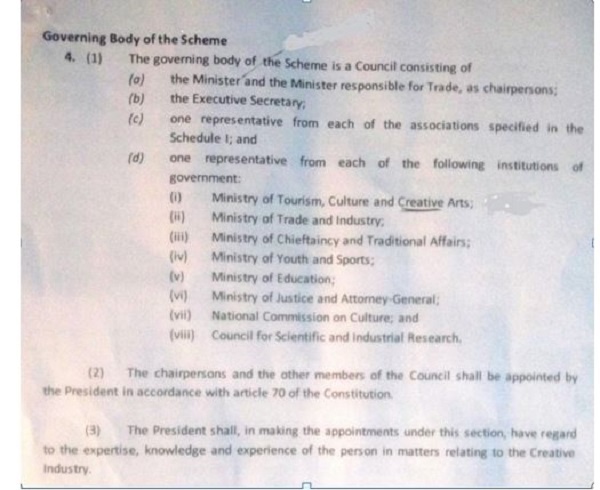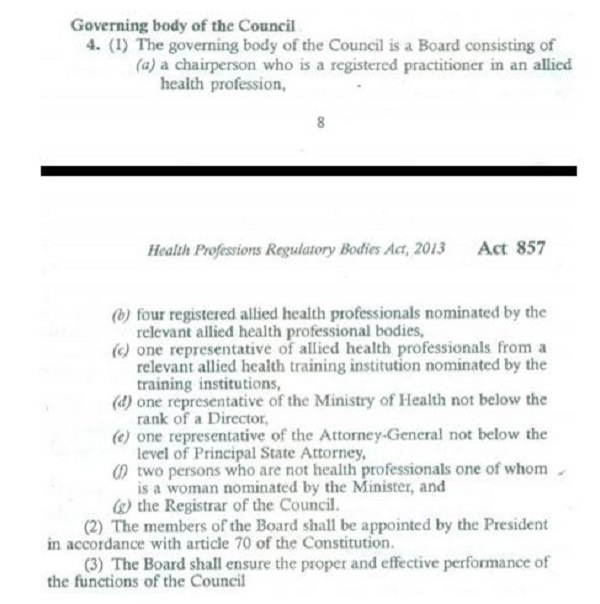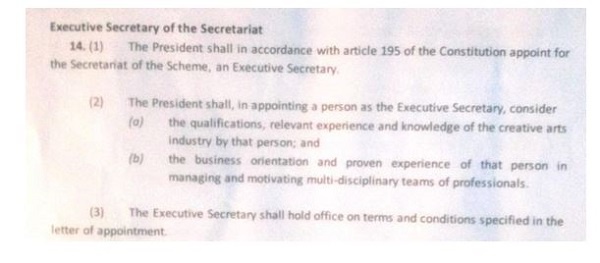 Federation Of Concerned Arts Professionals (FOCAP)
Federation Of Concerned Arts Professionals (FOCAP)
Federation Of Concerned Arts Professionals (FOCAP), an arts-based pressure group is seeking for a critical review of the Creative Industry Act 2014 bill.
The group after carefully examining the Act, has called on stakeholders in the creative arts sector and government to scrutinize the draft bill before it is finally passed into law.
Their concern as captured in a press statement, seeks to clarify some sections in the draft bill that would be very detrimental to the creative arts sector if passed and not amended.
Read the full statement from FOCAP
On the February 9 2018, FOCAP attended a stakeholder’s meeting at the Accra Tourist Information Centre, hosted by the Interim Creative Arts Council.
The event was well attended with a lot of industry big wigs in attendance. We had the privilege of seeing for the first time, the “CREATIVE INDUSTRY ACT 2014” which the stakeholder’s meeting was to discuss and bring up suggestions on the changes or otherwise to be made in the draft bill.
A lot of suggestions came across from various participants and the meeting ended well.
As an advocacy, research and pressure group, FOCAP has taken time to scrutinize the draft bill and we have come to the conclusion that the passing of this draft bill as it stands would be very detrimental to the creative arts sector. We have argued over a period that creative arts should not have a lot of political interference and especially the creative arts council. We believe the creative arts council should be treated just as other councils.
These councils are quasi government bodies which are run and controlled by players in the sector with just a little governmental stake. With this background, FOCAP would like to bring to the attention of all stakeholders, portions of the current “CREATIVE INDUSTRY ACT 2014” which should be changed with immediate effect.
Section 4 of the “CREATIVE INDUSTRY ACT 2014” talks about the governing body of the scheme, as in fig. 1 below;
Fig 1.

Obviously this puts the entire creative arts council under the control of the Minister of Tourism, Arts and Culture and the Minister of Trade since they are the chairpersons of the governing body. This we find highly inappropriate since these positions change based on political dispensation, we believe if left like this would derail the creative industry agenda for the country.
Our Suggestions
Just like other councils set up to govern various sectors of the country, it would be imperative to emulate the best. We believe that the “HEALTH PROFESSIONS REGULATORY BODIES ACT, 2013” ACT 857 Section 4 in fig 2 below sets a good precedence for this;
Fig 2.

We therefore suggest that section 4 of the draft bill be changed to; 4 (1) The governing body of the Scheme is a Council consisting of (a) A chairperson who is elected amongst the members of the board by voting.
(b) The Executive Secretary (c) Two registered and professional film makers nominated by the various film producers associations. (d) Two registered and professional music sector stakeholders to be nominated by the various music associations (e) Two registered and professional book publishers nominated by the various writers’ associations. (f) Two representatives from the fine arts sector nominated by the various associations. (g) Two representatives from the Screen and Theatre performers nominated by the various associations for actors and actresses.
(h) One representative from each of the following institutions of government not below the rank of Director (i) National Commission on Culture (ii) Ministry of Trade and Industry (iii) Ministry of Tourism, Arts and Culture (iv) Ministry of Education (v) Ministry of Youth and Sports (h) Two persons who are businessmen with significant investment and knowledge in the sector nominated by the Minister of Tourism, Arts and Culture.
(2) The members of the board shall be appointed by the various sectors and approved by the Minister of Tourism, Arts and Culture in consultation with the President.
Also Section 14 of the “CREATIVE INDUSTRY ACT 2014” explains how the Executive Secretary of the Secretariat comes into power. As is fig 3 below;
Fig 3.

We believe that subsection (3) of section 14 is a grey area that needs to be changed. As it stands now, the import of this subsection is that, by the letter of appointment, an executive secretary can be appointed for ten (10) years if the president wishes and this would not auger well for the development of the sector.
We therefore suggest that sub section be changed to; (3) The Executive Secretary shall hold office for not more than five (5) years on terms and conditions specified by the letter of appointment.
Under section 24 of the “CREATIVE INDUSTRY ACT 2014” which is captioned “Interpretation”
We also suggest that the word “President” should be interpreted under this section.
These are just a few of the suggestions we wish to proffer to stakeholders and the parliamentary select committee. A full petition would be channelled through the clerk of parliament on this CREATIVE INDUSTRY ACT 2014.
The Creative Industry has suffered long enough and we believe it’s time to move with speed and alacrity.
Kojo Preko Dankwa
Convener
0576655656
Mel Kwesi Davis
Convener
0246550298
Enoch Agyapong
Member
0244712136